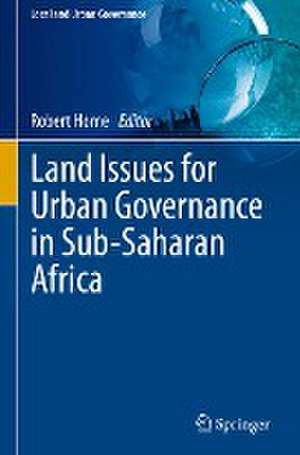Land Issues for Urban Governance in Sub-Saharan Africa: Local and Urban Governance
Editat de Robert Homeen Limba Engleză Hardback – 12 noi 2020
Among the topics addressed by the book are challenges to governance institutions: how international development is delivered, building land management capacity, funding for urban infrastructure, land-based finance, ineffective planning regulation, and the role of alternatives to courts in resolving boundary and other land disputes. Issues of rights and land titling are explored from perspectives of human rights law (the right to development, and women's rights of access to land), and land tenure regularization. Particular challenges of housing, planning and informality are addressed through contributions on international real estate investment, community participation in urban settlement upgrading, housing delivery as a partly failing project to remedy apartheid's legacy, and complex interactions between political power, money and land. Infrastructure challenges are approached in studies of food security and food systems, urban resilience against natural and man-made disasters, and informal public transport.
Preț: 1115.46 lei
Preț vechi: 1360.32 lei
-18% Nou
Puncte Express: 1673
Preț estimativ în valută:
213.45€ • 223.88$ • 177.69£
213.45€ • 223.88$ • 177.69£
Carte disponibilă
Livrare economică 11-25 martie
Preluare comenzi: 021 569.72.76
Specificații
ISBN-13: 9783030525033
ISBN-10: 3030525031
Pagini: 360
Ilustrații: XV, 360 p. 48 illus., 34 illus. in color.
Dimensiuni: 155 x 235 mm
Greutate: 0.64 kg
Ediția:1st ed. 2021
Editura: Springer International Publishing
Colecția Springer
Seria Local and Urban Governance
Locul publicării:Cham, Switzerland
ISBN-10: 3030525031
Pagini: 360
Ilustrații: XV, 360 p. 48 illus., 34 illus. in color.
Dimensiuni: 155 x 235 mm
Greutate: 0.64 kg
Ediția:1st ed. 2021
Editura: Springer International Publishing
Colecția Springer
Seria Local and Urban Governance
Locul publicării:Cham, Switzerland
Cuprins
Chapter 1 Land, law and urban governance.- Chapter 2 The Quest for “Good Governance” in Urban Land Issues in Sub-Saharan Africa.- Chapter 3 The Fiscal City: Financing Africa’s Urban Areas and Local Governments.- Chapter 4 Urban governance through religious authority in Touba, Senegal.- Chapter 5 The right to the city and South African jurisprudence.- Chapter 6 Urban land ownership and rights to sustainable development for women in Africa.- Chapter 7 Effectiveness of planning laws in sub-Saharan African cities.- Chapter 8 20 years of land management and land tenure education.- Chapter 9 Stocktaking Participatory and Inclusive Land Readjustment in Africa.- Chapter 10 Governance challenges in African urban fantasies.- Chapter 11 Land conflicts and ADR in Sub-Saharan Africa: The case of Botswana.- Chapter 12 Post-Apartheid Housing Delivery as a (Failed) Project of Remediation.-Chapter 13 Women, land and urban governance in colonial and post-colonial Zimbabwe.- Chapter 14 Urban land governance and corruption in Africa.- Chapter 15 Partnerships for successes in slum upgrading: governance and social change in Kibera, Nairobi.- Chapter 16 Urban resilience for achieving sustainability in Ghana.- Chapter 17 Food security and municipal powers in South Africa.- Chapter 18 The resilience of Informal Public Transport in Nigeria.- Chapter 19 Diagnosing the role of urban governance in disease outbreaks in Harare and Monrovia.- Chapter 20 African urban history, place-naming and place-making.- Chapter 21 Should Monrovian Communities Agree to Voluntary Slum Relocations: Land, Gender and Urban Governance.- Chapter 22 What next?.
Notă biografică
Robert Home has degrees in History (Cambridge), Geography (PhD, London), and Town Planning (Oxford Brookes), and is Emeritus Professor in Land Management at Anglia Ruskin University and a chartered town planner. His research publications are in planning history and land management, and he has undertaken research and consultancy in all regions of Africa.
Textul de pe ultima copertă
Sub-Saharan Africa faces many development challenges, such as its size and diversity, rapid urban population growth, history of colonial exploitation, fragile states and conflicts over land and natural resources. This collection, contributed from different academic disciplines and professions, seeks to support the UN Habitat New Urban Agenda passed at Habitat III in Quito, Ecuador, in 2016. It will attract readers from urban specialisms in law, geography and other social sciences, and from professionals and policy-makers concerned with land use planning, surveying and governance.
Among the topics addressed by the book are challenges to governance institutions: how international development is delivered, building land management capacity, funding for urban infrastructure, land-based finance, ineffective planning regulation, and the role of alternatives to courts in resolving boundary and other land disputes. Issues of rights and land titling are explored from perspectives of human rights law (the right to development, and women's rights of access to land), and land tenure regularization. Particular challenges of housing, planning and informality are addressed through contributions on international real estate investment, community participation in urban settlement upgrading, housing delivery as a partly failing project to remedy apartheid's legacy, and complex interactions between political power, money and land. Infrastructure challenges are approached in studies of food security and food systems, urban resilience against natural and man-made disasters, and informal public transport.
Among the topics addressed by the book are challenges to governance institutions: how international development is delivered, building land management capacity, funding for urban infrastructure, land-based finance, ineffective planning regulation, and the role of alternatives to courts in resolving boundary and other land disputes. Issues of rights and land titling are explored from perspectives of human rights law (the right to development, and women's rights of access to land), and land tenure regularization. Particular challenges of housing, planning and informality are addressed through contributions on international real estate investment, community participation in urban settlement upgrading, housing delivery as a partly failing project to remedy apartheid's legacy, and complex interactions between political power, money and land. Infrastructure challenges are approached in studies of food security and food systems, urban resilience against natural and man-made disasters, and informal public transport.
Caracteristici
Focuses on the new challenges of urban land governance in Sub-Saharan Africa following the adoption of the United Nations Sustainable Development Goals and the Habitat New Urban Agenda (passed at Habitat III in Quito in 2016) Cross-disciplinary treatment of a rapidly evolving topic Provides new knowledge from both academic and professional perspectives on land governance












